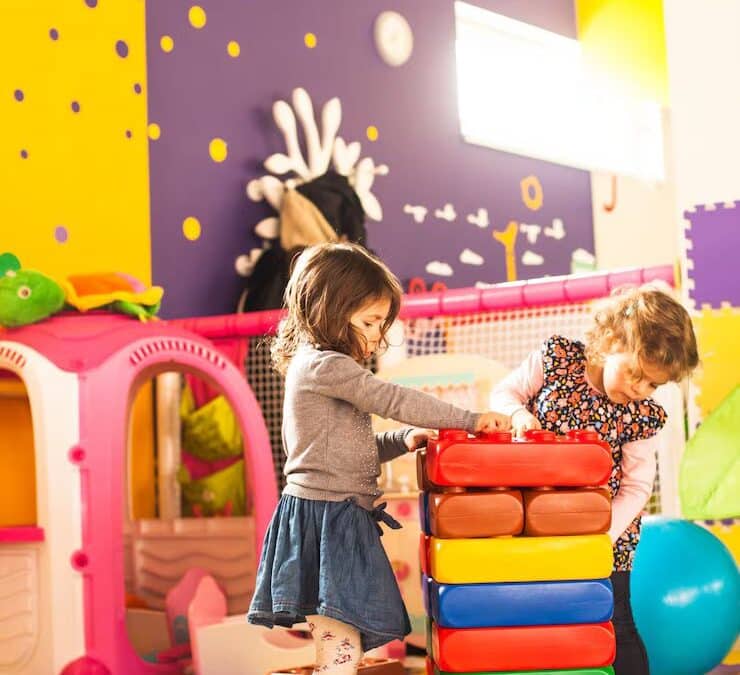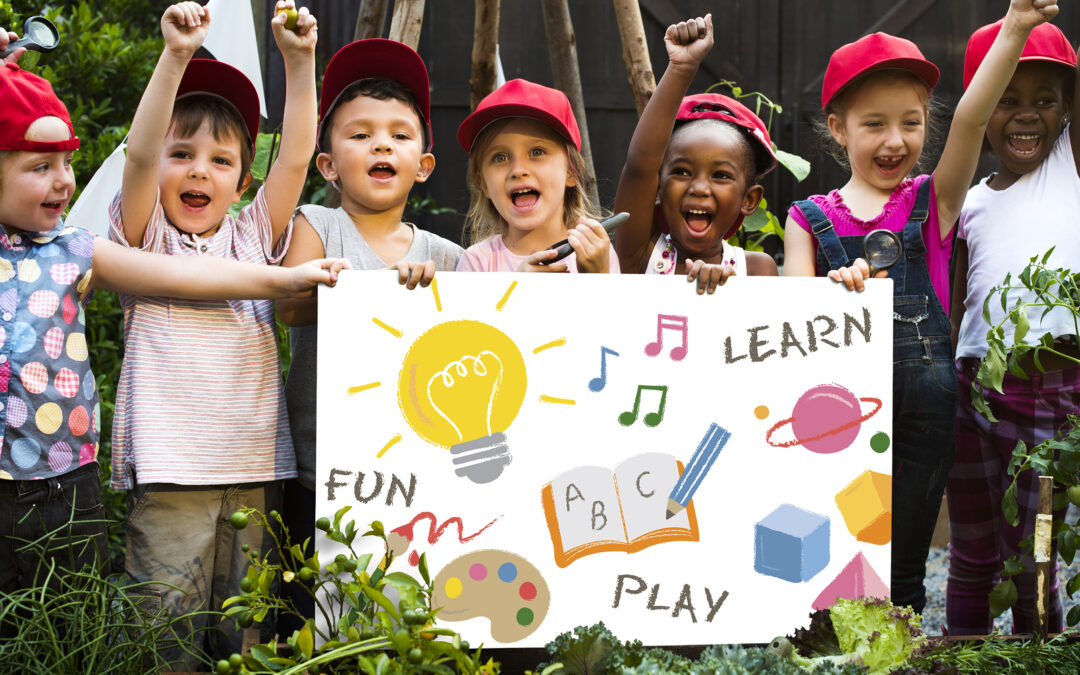Enrichment programs play a crucial role in the early development of children. These specialized activities go beyond being just extra hobbies; they are essential for nurturing young minds. Enrichment programs are designed to:
- Stimulate thinking
- Spark creativity
- Cultivate innate talents
They provide an environment where potential can thrive during the crucial years of growth.
These programs offer support in more than just academics. They cover all aspects of a child’s development, including:
- Physical growth
- Intellectual development
- Emotional well-being
- Social skills
Enrichment programs are beneficial for children from toddlerhood until they start formal schooling. They lay a strong foundation that supports important milestones in their growth.
The goal of enrichment programs is to create a world where every child’s unique abilities are recognized and nurtured. In this world, their passions become the guiding force towards long-term success.
The impact of these activities is wide-ranging and significant, influencing various areas such as:
- Cognitive abilities
- Emotional intelligence
- Social interactions
- Physical health
In this blog article, we will explore how these diverse experiences contribute to shaping well-rounded individuals who are prepared to face any challenge that comes their way.
1. Holistic Development through Diverse Experiences
Holistic development in early childhood involves nurturing a child’s physical, emotional, intellectual, and social abilities. It’s a comprehensive approach that looks at all aspects of a child’s growth potential. Preschool enrichment programs play a key role in promoting this kind of overall growth. These programs offer a range of activities designed to stimulate different areas of development at the same time.
Areas of Development Addressed by Preschool Enrichment Programs
Here are some examples of how preschool enrichment programs support different areas of a child’s development:
- Physical Development: Children take part in activities that improve their motor skills and overall health.
- Emotional Growth: Arts and storytelling sessions help children express their feelings and develop empathy.
- Intellectual Advancement: Exposure to puzzles, languages, and STEM (Science, Technology, Engineering, and Mathematics) activities helps sharpen cognitive abilities.
- Social Skills: Team sports and group projects encourage cooperation, communication, and problem-solving.
By participating in these programs, children get to explore various learning settings that contribute significantly to holistic development. The diverse nature of these activities ensures that children not only acquire new skills but also learn how to apply them in their everyday lives.
For more information on how these programs can be part of your child’s education, you might consider scheduling a tour or contacting us directly for a deeper insight into our offerings.
2. Nurturing Talents and Passions for Long-Term Success
Enrichment programs in early childhood play a vital role in identifying and fostering children’s unique talents and passions. Each child is an individual with distinct capabilities, interests, and strengths. An environment that nurtures these elements can set the stage for long-term success.
These programs provide a range of activities that cater to various interests and skill sets. Whether it’s art, music, sports, or science, enrichment activities are designed to engage and stimulate young minds in different ways. This diverse exposure allows children to explore their innate talents, thereby promoting a sense of self-discovery.
By participating in activities they love, children develop a sense of mastery and accomplishment. This also encourages passion-driven learning – a powerful motivator that leads to deep understanding and retention of knowledge.
Early exposure to Amici Montessori Programs is particularly effective as it offers a comprehensive curriculum that includes various after-school program ideas designed to engage young minds. Nurturing talents at an early age through such programs can significantly influence a child’s future academic and career choices.
3. Boosting Confidence and Self-Esteem through Skill Mastery
Enrichment programs for kids play a vital role in boosting confidence. The process of acquiring new skills can significantly enhance a child’s self-esteem. When children master a skill, be it painting a picture, solving a math problem, or scoring a goal in soccer, they experience a sense of accomplishment. This success breeds confidence.
How Skill Mastery Boosts Confidence
Let’s consider an example: A child participates in an art enrichment program at Amici Montessori where they learn to paint. As the child gradually improves and creates artwork they’re proud of, their confidence soars. They begin to believe in their abilities, which can translate into increased confidence in other areas of life as well.
The same principle applies to all enrichment activities. Whether it’s learning how to cook or exploring the world through science experiments like those offered by Chandler’s Educational Oasis, mastering new skills instills a sense of achievement and self-belief in children
A Comprehensive Look at Different Types of Enrichment Programs
Sports and Recreation: Fostering Physical Fitness and Social Skills through Play
Engaging in sports and recreation is not just about running around or kicking a ball; it’s a fundamental aspect of childhood development that lays the groundwork for lifelong wellness. When you introduce your child to these activities, you’re not only promoting physical development but also crucial social skills.
Physical Fitness:
- Encourages overall health and combats obesity
- Enhances coordination, agility, and balance
- Builds endurance and strength
Social Competence:
- Teaches teamwork and cooperation
- Develops communication skills
- Helps children understand fair play and respect
By integrating sports into early education, such as the approach seen in Montessori programs, children experience structured play that emphasizes both skill-building and social interaction. This balanced approach nurtures not just the body, but also interpersonal relationships.
Expanding Horizons with Foreign Languages: Cognitive Advantages and Cultural Awareness
Learning foreign languages at an early age brings a host of cognitive benefits:
- Enhances memory, problem-solving skills, and critical thinking
- Improves multitasking abilities
- Establishes a solid foundation for advanced language acquisition later on
Moreover, this type of enrichment immerses children in new cultures, fostering an appreciation for diversity that enriches their global perspective.
Creative Expression through Arts: Unleashing Imagination and Emotion
An art enrichment program serves as an outlet for creativity, enabling young minds to express themselves without boundaries. Through various mediums:
- Painting
- Sculpture
- Drama
Children delve into a world where imagination reigns supreme. These creative experiences are instrumental in developing emotional intelligence and empathy.
Exploring the Wonders of Science, Technology, Engineering, and Math (STEM): Cultivating Curiosity and Problem-Solving Skills
Incorporating STEM education into early learning curricula is like giving children a key to unlock the mysteries of the world around them. Engaging in STEM activities:
- Stimulates curiosity about natural phenomena
- Encourages experimentation and hands-on learning
- Sharpens analytical skills necessary for future academic endeavors
The Flavors of Life: Developing Healthy Habits and Cultural Appreciation through Cooking Classes
Participation in cooking classes is much more than following recipes; it’s an educational journey that promotes:
- Nutritional knowledge and healthy eating habits
- Fine motor skill development through food preparation techniques
- Exposure to global cuisines that expand cultural understanding
The Harmonious World of Music: Cognitive, Emotional, and Social Benefits for Young Learners
Lastly, music enrichment classes strike a chord with comprehensive childhood development by offering:
- Rhythm and melody exercises that improve auditory discrimination
- Opportunities to collaborate with peers in ensembles or choirs
- A medium for emotional expression that resonates deeply within young hearts
By integrating music into early education settings, children engage with sound in ways that enhance cognitive function while building community.
Each type of program plays a distinct role in shaping well-rounded individuals ready to explore further horizons.
Horizons with Foreign Languages: Cognitive Advantages and Cultural Awareness
In the realm of enrichment programs, foreign languages hold a unique position. They extend beyond academic learning, paving the way for cognitive development and cultural awareness from an early age.
Cognitive Development
The process of learning a second language can stimulate cognitive skills in children. It enhances their problem-solving abilities, boosts memory retention, and improves attention span. According to a study by the American Council on the Teaching of Foreign Languages, bilingual children often perform better in tasks that require multitasking, decision-making, and problem-solving.
Cultural Awareness
Introducing children to foreign languages helps them understand different cultures and customs. This exposure broadens their perspectives, fostering an appreciation for diversity at an early age. Learning about different cultures can help children become more empathetic and open-minded.
Thus, incorporating foreign language classes into enrichment programs unlocks a world of cognitive benefits while fostering a deeper understanding of global cultures
Creative Expression through Arts: Unleashing Imagination and Emotion
Art enrichment programs are an essential part of a child’s development, just like sports, foreign languages, STEM education, cooking classes, and music enrichment classes. Each program has its benefits, but art programs specifically focus on nurturing creativity and imagination.
Here’s how art programs can benefit children:
- Creativity Amplified: Artistic activities encourage children to think outside the box and develop original ideas.
- Imaginative Play: Through drawing, painting, or sculpting, children explore their inner worlds, bringing abstract concepts to life.
- Emotional Vocabulary: Art allows for the non-verbal expression of feelings, providing a safe space for emotional exploration and communication.
- Cognitive Skills: Engaging with art enhances visual-spatial skills and hand-eye coordination.
By including art in early education, children learn valuable skills that help them express themselves better and understand the world around them. These benefits go beyond just creating artwork – they also influence how children approach problems and see things in their everyday lives
Exploring the Wonders of Science, Technology, Engineering, and Math (STEM): Cultivating Curiosity and Problem-Solving Skills
In the dynamic world of early childhood development, STEM education stands out as a pillar for nurturing young inquisitive minds. This approach integrates science, technology, engineering, and mathematics into learning experiences that are both engaging and educational. Children are natural explorers; STEM programs leverage this innate curiosity by presenting challenges that encourage learners to ask questions, experiment, and solve problems.
- Science: Young children discover the basics of the physical world around them. They learn to observe patterns, predict outcomes, and understand natural phenomena.
- Technology: Exposure to technology in a controlled environment can enhance digital literacy and introduce children to the concept of digital creation versus consumption.
- Engineering: Simple building tasks foster an understanding of design, structure, and mechanics. These activities often involve teamwork, enhancing both cognitive skills and social development.
- Mathematics: Through games and practical activities, children grasp fundamental mathematical concepts which are crucial for analytical thinking.
By integrating STEM into early education, children develop critical thinking abilities that are essential not just in academics but in everyday life. These programs lay a strong foundation for lifelong learning and adaptability in an ever-evolving technological landscape.
Transitioning from the tactile creativity fostered in art enrichment programs to the structured problem-solving within STEM fields offers a balanced approach to development. Each type of enrichment program, be it sports and recreation or foreign languages, contributes uniquely to a child’s growth.
- The Flavors of Life: Developing Healthy Habits and Cultural Appreciation through Cooking Classes
Engaging children in cooking classes serves as more than just a fun activity; it’s a gateway to instilling lifelong healthy habits and fostering cultural appreciation. When children are involved in the culinary process, they:
- Learn about nutrition and the benefits of eating varied foods
- Gain hands-on experience with ingredients from different cultures
- Develop an understanding of healthy food choices that can prevent childhood obesity
These practical sessions are not just about following recipes; they’re interactive experiences that educate young minds on the importance of a balanced diet and expose them to the rich tapestry of global cuisines. This exposure broadens their palates and their perspectives, encouraging openness to new experiences.
Cooking classes stand alongside sports and recreation, foreign languages, art enrichment programs, and STEM education, each bringing its unique contributions to early development. While music enrichment classes tap into cognitive and emotional growth, cooking classes blend practical life skills with cultural exploration, proving that learning can be both flavorful and nourishing.
- The Harmonious World of Music: Cognitive, Emotional, and Social Benefits for Young Learners
Enrichment programs in music play an important role in child development. Music enrichment classes are not just about learning to play an instrument or sing. They offer many benefits that cover thinking, feelings, and social areas.
- Cognitive Benefits
Children participating in music enrichment classes often show improved thinking skills. Learning to read musical notes and understand rhythm can help with math skills and how we see things in space and time. Playing an instrument or singing needs focus and attention, which can improve memory and concentration.
- Emotional Development
Music is also a way for children to express their feelings. They learn to connect different tunes and rhythms with different emotions, which helps them grow emotionally.
- Social Skills
Music classes also give children chances to work together and get along with others. They work as a team during group performances or band practices, where they learn how to work together, share, be respectful, and communicate.
Implementing a Successful Enrichment Program at Your Childcare Center

Key Benefits for Childcare Centers and Families
Childcare business owners seeking to enhance their preschool curriculum and gain a competitive advantage can achieve significant success by implementing comprehensive enrichment programs. These programs provide tangible benefits for both childcare centers and families, which include:
Offering quality enrichment programs positions childcare centers as progressive and dedicated to the multifaceted development of children. This can be a deciding factor for pa
- Increased Attractiveness to Prospective Families
rents when choosing the right center for their child’s early education.
- Holistic Child Development
Children benefit from exposure to diverse activities that go beyond traditional learning. Enrichment programs in arts, sports, STEM, and more contribute to the child’s physical, cognitive, emotional, and social development.
- Community Building
When children from various backgrounds come together in enrichment activities, it fosters a sense of community and understanding. This is beneficial for both the children who learn to appreciate diversity from an early age and for families who become part of a supportive network.
- Enhanced Reputation
Childcare centers that offer well-rounded enrichment programs often enjoy positive word-of-mouth referrals. Parents are keen to share their satisfaction with programs that contribute positively to their child’s growth.
- Convenience for Families
Integrating enrichment activities within the existing structure of childcare provides parents with a convenient solution. They appreciate the value of not having to seek additional programs outside of their childcare center.
- Professional Development for Staff
Teachers and caregivers have opportunities to develop new skills and expertise by participating in the design and delivery of enrichment programs. This leads to higher job satisfaction and improved staff retention rates.
By including these benefits in marketing materials and tours for potential clients, childcare centers can effectively communicate the value added by their enrichment programs.
The next step involves ensuring that these programs are well-designed, align with educational standards, are appealing to children, and integrate seamlessly with the current offerings at the childcare facility.
Steps to Create an Effective Enrichment Program
Creating an enrichment program within a childcare center involves careful planning and execution. Childcare business owners aiming to infuse their preschool curriculum with enrichment opportunities can follow these steps for successful implementation:
- Research and Development
- Investigate the interests and needs of the children and families served by your center.
- Review current trends and proven approaches in early childhood enrichment.
- Program Design
- Decide which types of enrichment programs to offer, such as music, sports, arts, STEM, cooking classes, or foreign languages.
- Determine the structure of the program, including class sizes, frequency, duration, and age-appropriate activities.
- Staffing
- Consider hiring or training staff with specialized skills pertinent to the selected enrichment activities.
- Ensure that all staff members involved are passionate about child development and have a clear understanding of the program goals.
- Budgeting
- Create a detailed budget that includes costs for materials, staff compensation, marketing, and any additional resources required.
- Explore potential funding sources or partnerships to offset expenses and increase accessibility for families.
- Marketing and Promotion
- Develop marketing strategies to highlight the unique aspects of your enrichment offerings.
- Communicate the benefits of offering enrichment programs to both current and prospective families.
- Implementation
- Roll out the program incrementally if necessary to manage resources effectively.
- Gather feedback from children and parents to make continuous improvements.
- Evaluation
- Establish benchmarks for success based on participation rates, family satisfaction, and children’s progress.
- Regularly assess program impact to ensure it meets your childcare center’s standards for quality education.
By leveraging these steps strategically, childcare centers can not only provide value-added services but also gain a competitive advantage in the marketplace. The key is to align these enrichment programs with the center’s mission and values while consistently seeking input from families to meet their evolving needs.
Selecting Age-Appropriate Activities for Young Children
One of the most important parts of creating a successful enrichment program in your childcare center is choosing activities that are right for the age group. It’s essential to have a preschool curriculum as the foundation for this decision-making process, making sure that each activity is suitable for the children’s current stage of development.
Tailoring Activities to Developmental Stages
Here are some guidelines on how to select age-appropriate activities:
Younger Preschoolers (Ages 2-3): Focus on activities that promote basic skills such as hand-eye coordination, sensory exploration, and social interaction. Some examples include:
○ Simple cooking classes
○ Introductory sports games
○ Basic arts and crafts
- These activities not only bring joy but also help children develop essential motor skills and social abilities.
- Older Preschoolers (Ages 4-5): Introduce more complex activities that encourage cognitive growth, problem-solving, and creativity. Consider options like:
○ Learning a foreign language
○ Exploring STEM topics (science, technology, engineering, math)
These activities stimulate thinking skills and prepare children for future academic success.
By understanding these different stages of child development and tailoring activities accordingly, childcare business owners can gain a significant advantage over their competitors. This strategic approach ensures that their enrichment programs are not only fun but also beneficial in supporting children’s overall growth.
Benefits for Children and Childcare Businesses
Offering age-appropriate activities in your enrichment programs brings several advantages for both the children and your childcare business:
- Child Development: Activities that are aligned with children’s developmental needs can significantly impact their growth in various areas, including physical, cognitive, social, and emotional development.
- Parent Satisfaction: When parents see that your center prioritizes their child’s individual needs and provides a wide range of learning experiences, they are more likely to be satisfied with your services.
- Word-of-Mouth Recommendations: Happy parents are likely to share their positive experiences with others, which can lead to increased enrollment and a strong reputation within the community.
- Differentiation: In a competitive childcare market, having well-designed enrichment programs can help differentiate your center from others and attract prospective families.
Ultimately, the success of an enrichment program lies in its ability to support children’s holistic development while keeping them engaged and excited about learning. Carefully selecting age-appropriate activities is key to achieving this goal and reaping the long-term benefits for both the children and your childcare business.
Budgeting and Marketing Strategies for a Successful Program Launch
A successful enrichment program implementation requires careful budgeting and strategic marketing. Childcare business owners must consider the costs associated with hiring skilled instructors, purchasing necessary materials, and investing in suitable spaces for the various activities.
Budgeting
When it comes to budgeting, you must take into account the initial cost of setting up your program. This includes hiring professionals who have expertise in different fields such as sports coaches, language tutors, or music teachers. Additionally, you’ll need to factor in the cost of materials for each class, which can range from art supplies to sports equipment or cooking utensils.
Marketing
Effective marketing of your enrichment program can help attract families who are looking for comprehensive growth opportunities for their children. Here are some strategies you can use:
- Utilize digital channels such as social media platforms, email newsletters, or your childcare center’s website to promote the program.
- Share testimonials from satisfied parents and showcase success stories to build trust and credibility.
- Collaborate with local schools or community organizations to reach a wider audience.
- Offer special promotions or discounts for early sign-ups.
Remember, a well-executed enrichment program doesn’t only benefit children by fostering holistic development – it also provides significant advantages to childcare centers. Offering an array of enrichment programs gives your center a competitive edge, attracting more families seeking diverse learning opportunities for their children. This increase in demand can lead to higher enrollment rates, enhancing both the reputation and financial health of your preschool curriculum.
The Vital Role of Reflective Supervision in Ensuring Program Quality
Reflective supervision is extremely important in early childhood education, especially in enrichment programs. It plays a crucial role in maintaining high program quality. Here’s why:
Introspective: Encouraging Self-Reflection
Reflective supervision encourages educators to think deeply about their interactions with children and how they respond to those interactions. This introspective process helps them gain insights into their teaching practices and identify areas for improvement.
Supportive: Balancing Emotional Support and Professional Growth
Supervisors provide emotional support to teachers while also challenging them to expand their professional skills. This supportive environment creates a safe space for educators to take risks, try new strategies, and grow as professionals.
Informative: Bridging Theory and Practice
Reflective supervision assists teachers in translating theoretical knowledge into practical classroom strategies. It helps them understand how to effectively manage activities, create engaging learning environments, and meet the diverse needs of children.
The significance of reflective supervision lies in its ability to enhance program quality by ensuring that educators:
- Stay actively involved in their growth and development
- Stay updated on the latest research findings and best practices
- Remain responsive to the unique needs of each child
By prioritizing reflective supervision, enrichment settings promote a culture of professional development that is crucial for maintaining high standards of teaching and nurturing young minds effectively.
Fostering a Culture of Continuous Growth: Benefits of Reflective Supervision for Teachers and Staff
Reflective supervision is not just beneficial for the quality of enrichment programs; it also greatly contributes to the professional growth and job satisfaction of teachers and staff members.
Professional Growth
Engaging in reflective supervision allows teachers to critically analyze their teaching methods and interactions with students. It helps them understand their strengths and areas for improvement, fostering an environment of continuous learning and development. The process encourages them to experiment with different teaching approaches, enhancing their skills and increasing their versatility.
Job Satisfaction
With regular feedback, teachers can feel more assured about their performance. Recognizing their progress and achievements boosts morale, creating a more positive work environment. This sense of accomplishment leads to increased job satisfaction.
By incorporating reflective supervision into the routine practices of your enrichment program, you are not only ensuring the quality of the program but also investing in the growth and satisfaction of your staff. This dual benefit makes reflective supervision an essential component of successful enrichment programs.
Building Strong Supervisor-Staff Relationships through Collaborative Reflection
Establishing a supportive and collaborative environment through effective supervisor-staff relationships is an essential aspect of enrichment programs. The heart of this relationship-building lies in collaborative reflection.
- Collaborative reflection involves open dialogue and mutual respect, enabling a shared understanding and commitment to the child’s holistic development.
- The supervisor’s role is not just to guide but to actively participate in the learning process. This fosters a sense of camaraderie and shared responsibility.
- Regular meetings, feedback sessions, and joint planning are practical ways to facilitate collaborative reflection. These interactions strengthen the bond between supervisors and staff, promoting an environment that encourages growth.
Through these practices, supervisors can build strong relationships with their staff. The resulting teamwork leads to consistent, high-quality delivery of enrichment activities, effectively supporting children’s comprehensive development.
Ensuring Successful Implementation in Early Childhood Settings
Reflective supervision can be effectively adopted in infant and early childhood professional settings, such as toddler programs and preschools. However, to ensure a successful implementation, specific strategies need to be put in place:
- Consistent Training: Regular training courses should be organized for all staff members. These courses should cover the principles of reflective supervision, its benefits, and practical methods for implementing it.
- Clear Expectations: The expectations from staff regarding reflective supervision should be clearly communicated and understood by everyone involved. This reduces ambiguity and fosters a culture of open communication.
- Supportive Environment: A non-judgmental and supportive environment is crucial for the success of reflective supervision. Staff should feel safe to share their thoughts and experiences without fear of criticism.
- Regular Feedback: Constructive feedback plays an important role in the process. Regular feedback sessions can help identify areas of improvement, celebrate successes, and maintain momentum.
Remember that each setting is unique. What works best for one may not work for another. Therefore, it’s essential to adapt these strategies according to the specific needs and dynamics of your early childhood setting.
Conclusion
Enrichment programs play an important role in the development of young children. They help children grow in all areas, discover their unique talents, and feel good about themselves by becoming skilled at something. These programs are crucial for laying the groundwork for children’s future achievements.
Enrichment programs offer a wide range of activities, such as sports, languages, arts, STEM education, and cooking classes. This ensures that every child can find something they’re interested in and passionate about.
Integrating comprehensive enrichment programs into childcare centers can bring great benefits. Not only does it make the centers more competitive, but it also adds value to families who want to support their children’s overall growth.
Amici Montessori, located in Ahwatukee, Phoenix, is a shining example of how high-quality enrichment programs can make a difference. They offer a variety of experiences designed to promote growth and learning, making them an inspiration for other childcare centers looking to make a positive impact on early childhood development.
Childhood is a time of endless exploration and discovery. As educators and caregivers, we must enhance this period with opportunities that spark curiosity, encourage creativity, and build confidence in our young learners. By fully embracing the potential of enrichment programs, we can ensure that every child has a meaningful learning journey that sets them up for success throughout their lives.











